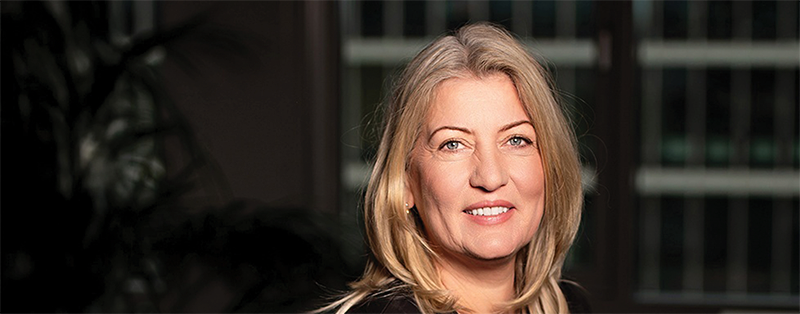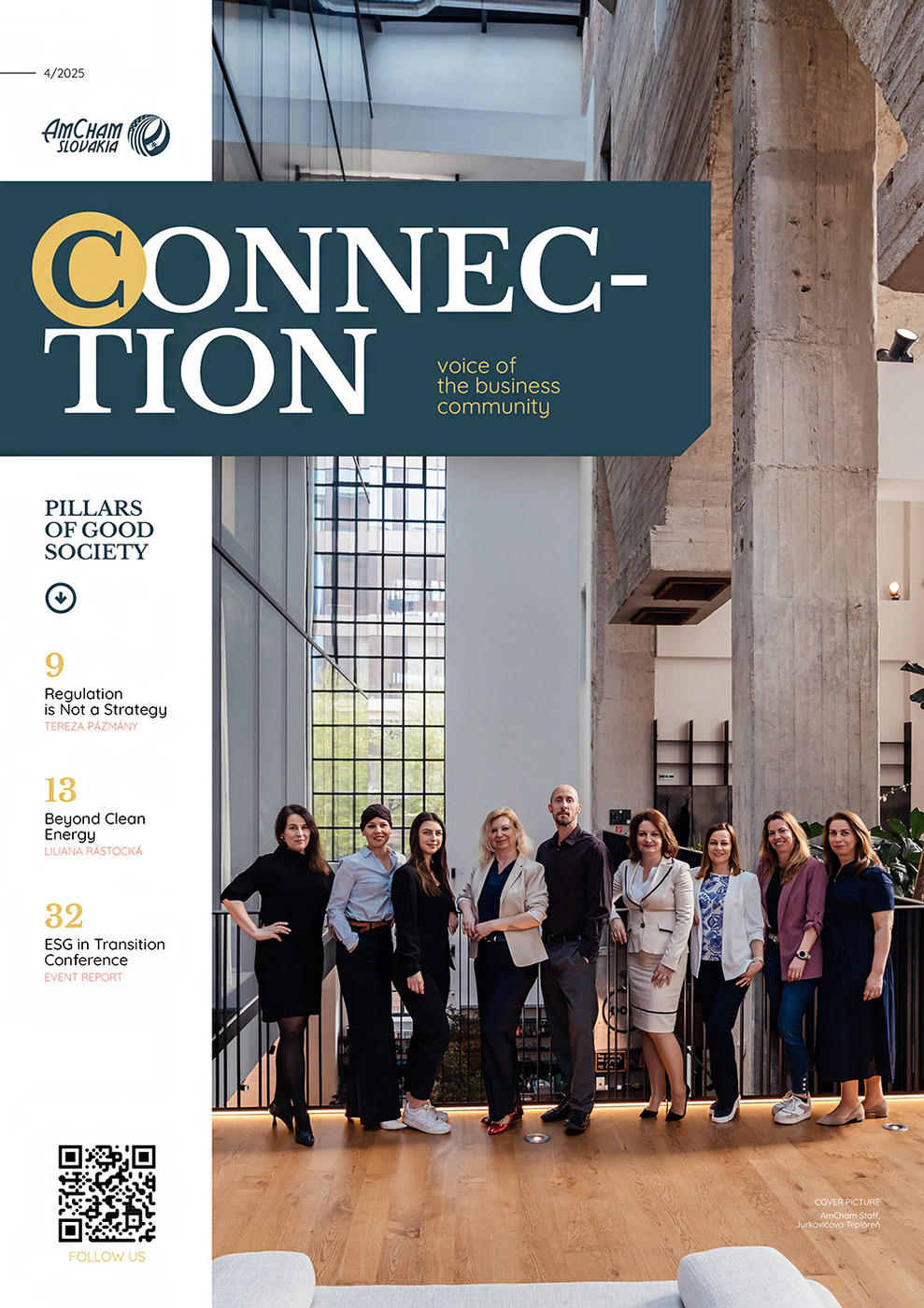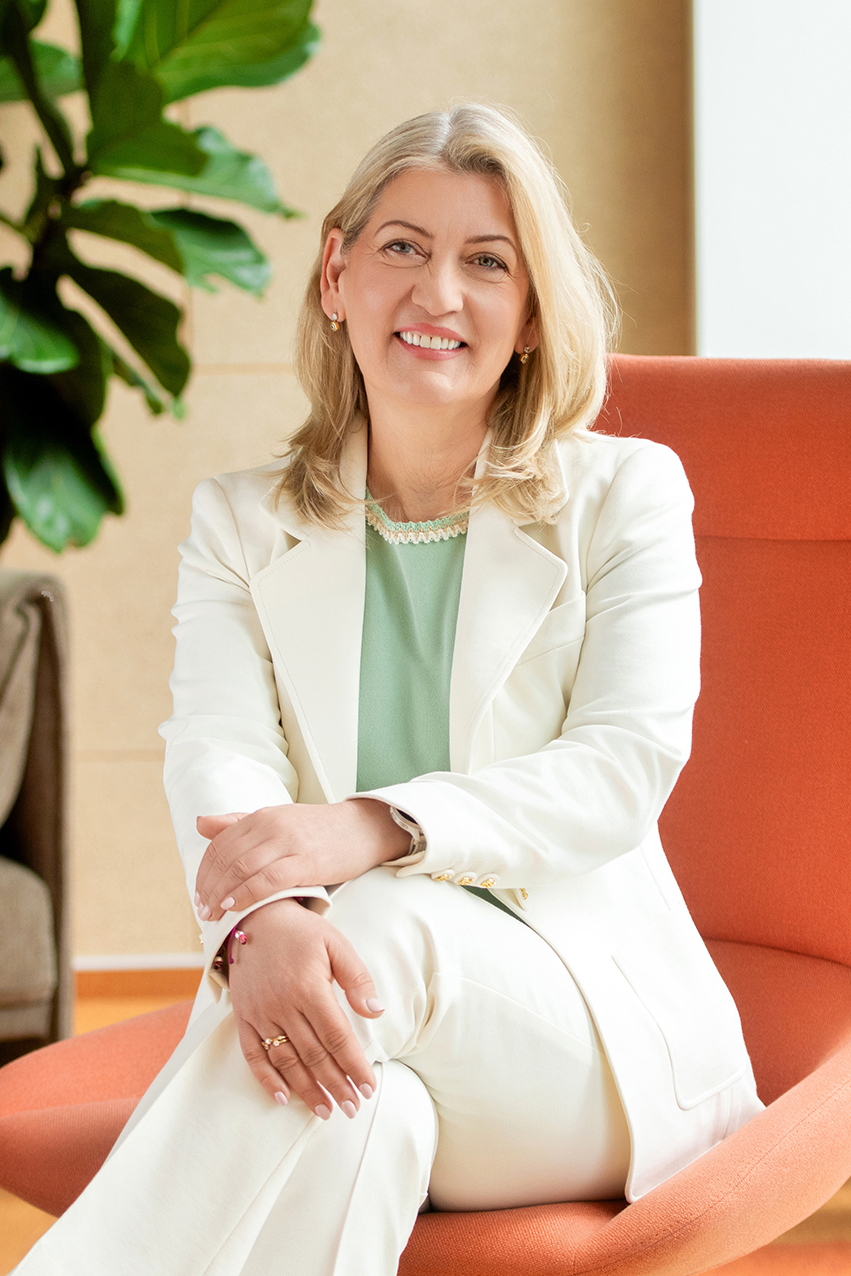
She also explains how digital optimism highlights both the opportunities and risks of digitalization—and why it must also include an element of transparency to ease the concerns of all involved.
In May, at the press conference for Telekom’s no hate speech campaign Graduates of Bullying, you said you’re a digital optimist. What does that mean in a country where the DESI Index is still not flattering?
Digital optimism, to me, is the belief that technology can make life easier for people and businesses. Companies use digital technologies to transform operations, improve customer experience, and increase efficiency, fostering a sense of progress. For me, digitalization equals progress, making the future better than the past. For Slovakia, as a country in the European “digital peloton” measured by DESI, combining digital technologies with the development of digital skills is essential for sustainable growth.
In your view, what is the best “calling card” of digital leadership in 2025?
A network you can rely on, and a team that can turn it into an experience. We invest in 5G and fiber to ensure not only high-quality technical performance but, most importantly, reliability in everyday life. We’ve already surpassed coverage of more than one million households with fiber – without which 5G cannot be truly robust. But digital leadership is not just about speed; it’s about investment into the future: schools teaching innovatively, hospitals providing telemedicine, and businesses competing on a global scale. 5G and fiber may sound like technical terms – but they are bridges connecting people to opportunities. They also create possibilities for cities, from smart lighting to traffic and energy management. These are things that improve quality of life, even if people don’t directly associate them with two ´letters´ 5G.
Where do you see the biggest shift that 5G will enable?
In industry and education – places where new skills and productivity are born. I’m particularly excited about our cooperation with the Technical University of Košice, where in 2023 we launched Slovakia’s first private 5G SA network and are building campus solutions to test intelligent logistics, automation, and “factories of the future.” The university ecosystem is an ideal space for companies and academics to try out real use cases before deploying them into production – and for industry, it’s a unique chance to innovate without risk.
Innovation and infrastructure are key, but success is ultimately judged through the eyes of the customer. What does customer experience mean to you personally?
Customer experience is the foundation of our business. I believe that a good customer experience starts with the moment when everything works – the product is relevant, service is clear, fast, and fair. Technologies can be as advanced as you like, but if the customer doesn’t feel listened to, understood and supported, it will never be a success. Customer experience is also closely linked to trust in the brand. What role do ESG and sustainability play in this?
Customer experience is also closely linked to trust in the brand. What role do ESG and sustainability play in this?
For me, ESG is not about reporting—it’s about ensuring and measuring a company’s long-term viability. As part of Deutsche Telekom, we follow a global strategy with clear milestones. A key goal is our ambition to be carbon neutral by 2040. Today, we use electricity exclusively from renewable sources. Energy efficiency and the shift to clean energy go hand in hand with digitalization.
How is it translated into your activities in Slovakia?
In Slovakia, this means continuous investment into advanced technologies and innovations that incorporate ecological considerations, both in our networks and products – from reducing energy consumption in 5G, through circular solutions, to customer initiatives like eco-coupon driving circularity. This is where ESG connects to customer experience: people trust brands that not only deliver quality services but also but also act responsibly toward society. That’s why sustainability is not an obstacle to growth – on the contrary, it is the condition for building trust and long-term positive impact.
Some entrepreneurs argue that ESG slows them down. What would you say to them?
Sustainability is about the ability to think decades ahead. For me, it’s not about regulations or spreadsheets, but about the fact that if we want our children to have a chance to live in a healthy environment, we must act today. Every energy-saving measure, every step toward renewable resources or recycling, is a building block for a future where the digital world and nature can coexist in balance. If you look at sustainability through energy efficiency, circularity, or supplier resilience, you realize that ESG is a business argument.
We live in uncertain times – marked by conflicts, wars and climate change. This uncertainty forms an ideal breeding ground for disinformation and opinion manipulation. How do you reflect that in your corporate responsibility activities?
For many years, we have been committed to responsible behavior on the internet and want to stand up to false or misleading media content through various projects. With the “No Hate Speech” initiative, we have been campaigning in Slovakia since May 2025 for an internet where everyone can take advantage of the opportunities of the digital world – without having to fear exclusion or hatred. Our campaign includes, for example, the website www.absolventisikany.sk , which offers advice for parents, teachers, friends, and, most importantly, potential victims of cyberbullying on how and where to find help. Imagine that every third student in our country has already been a victim of cyberbullying. We must all stand against it and work together to make the digital space safe. How many people are you able to reach through your corporate responsibility programs?
How many people are you able to reach through your corporate responsibility programs?
More than 80 million – that is how many people are expected to benefit from our commitment to promoting the digital society across the Deutsche Telekom Group between 2024 and 2027: As beneficiaries, they learn new skills, adapt their attitudes or behavior, or simply notice a positive change in their everyday lives.
Could you be more specific please who the key beneficiaries are?
Our beneficiaries in the area of digital society include people who use our media literacy platforms, participants in workshops, and users of free telephone counseling services and discounted rates.
The digital world is evolving at an ever faster pace – currently driven primarily by rapid progress in the development of AI. At the same time, the personal, economic and social well-being of all people depends heavily on digital inclusion. Is this a challenge or an opportunity for you?
We are committed to breaking down barriers. With inclusive products, affordable services and programs that build media competence, we aim to enable access to the digital society for everyone.
The internet has evolved into an indispensable part of our daily social lives. Despite the numerous advantages that digitalization brings, there are still people who face challenges in fully participating in the digital world. We are committed to ensuring that everyone has an opportunity to take part in the digital world. For us, this also includes protecting the rights of consumers and end-users – especially children and young people – as well as enabling assistance in emergency situations as we continue to expand the network.
How do you ensure equal opportunity? Where is the magic?
I would sum it up in three words: Access, Affordability and Ability - meaning media literacy.
We constantly invest heavily in network expansion to provide fast, reliable internet even in rural areas. Access also means “Design for All,” ensuring our products and services are easy to use for everyone. This includes, for example, specialized technology and products for seniors. We are known for supporting hearing impaired customers and are currently implementing measures aligned with the Accessibility Act.
We are living in turbulent times when affordability can be a challenge. How are you preparing for that?
You are right, affordability is another essential pillar of digital inclusion. As 5G coverage grows, we want high-quality products and services to be accessible to as many customers as possible. That’s why we offer our own 5G smartphones. In August, we launched the T Phone 3 and T Tablet 3, which not only provide advanced technology but are also the first AI-enabled devices in Slovakia. Since this summer, we offer our customers using our Telekom app AI for free - through our Magenta AI which is powered by Perplexity. Just press the bottom on the screen and you can use AI advantages, for free. This is also a way how we democratize AI – enabling access to AI for everybody. Based on the latest Digital Decade Report, Slovakia still has room for improvement in digital skills. Where do you stand as a company on this?
Based on the latest Digital Decade Report, Slovakia still has room for improvement in digital skills. Where do you stand as a company on this?
Media literacy means using digital media safely and competently. Young people today grow up in an environment that is strongly influenced by digital media. It is essential that children and young people learn to navigate the internet confidently and safely. We want to support them in this and promote their media literacy with numerous measures, initiatives and expert partnerships. Our key platform is the ENTER program, which offers activities for both primary-school students and seniors.
Which audience do you target more?
Both are important. The ENTER program for schools launched five years ago. Since then, more than 100,000 children have participated, and 2,700 teachers have been trained and passed on their knowledge to future bright minds from more than 700 primary schools across the country.
What has been the game changer with ther ENTER program?
We have realized during this program, that today´s ´ENTER´ generation is equally keen on technological skills, coding, robotics, but also on collaboration, communication, applying their creativity and learning problem-solving.
Bringing together children aged 11–15 to incorporate STEM into daily learning—through interschool contests like the MicroBitCup or summer camps—has inspired them to use technology to improve quality of life and it provides them with a solid foundation for the future. ENTER has achieved an important milestone: fostering diversity in thinking and innovation through technology. I have great respect for the teachers who present modern technologies to kids in such an attractive and engaging way.
Recently, the digital safety of seniors has drawn significant attention. How do you embrace this challenge?
As mentioned, media literacy is a topic not only for kids, but also older people. The second pillar of the ENTER program includes educational activities designed to help seniors use technologies safely. This autumn we will announce, already for the fifth time, a nationwide grant program for organizations helping seniors develop digital skills and supporting their digital safety. Our grandparents have the same needs as young people and our Enter program fulfills them: not only learning basic digital skills for safe use, but also understanding how to protect their privacy and deal with disinformation or even digital crime.
Speaking of digital skills, Slovakia still has a shortage of women in tech. In an interview last year, you said that “women don’t need different skills than men.” Is that still true?
I mean it quite literally. In technology, we need more diversity – not because women have different abilities, but because mixing perspectives leads to better decisions. Diverse teams bring not only better decisions but also a culture of trust and innovation. If we want to be a digital leader, we must create an environment where everyone can contribute their perspective. A leader must be able to clearly articulate the goal, unite the team, and stand by values – these are universal qualities.

Melinda Szabó, CEO of Slovak Telekom and T-Mobile Czech Republic



Follow us